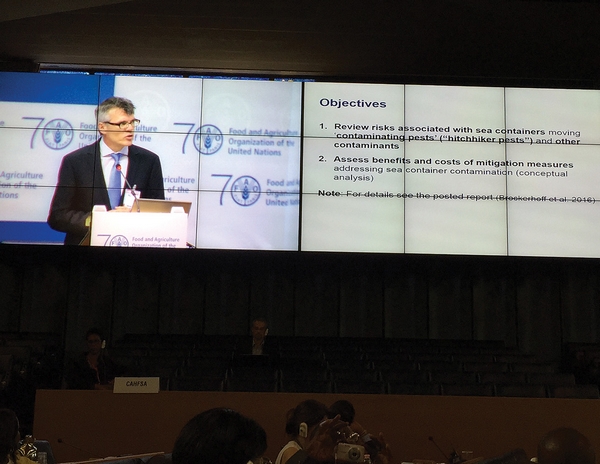Protecting New Zealand from invasive ‘hitchhiker’ pests
IO5: Market access and risk management
Around 90 per cent of international trade today is carried by sea, mostly in sea containers. This amounts to a worldwide total port throughput per year of some 300 million containers.
The downside to this unprecedented level of global trade is the transport of unwanted contaminants, including ‘hitchhiker’ pests that are transported on, or in, the actual containers themselves, irrespective of cargo.
Well-known contaminating pests found on containers include the gypsy moth, giant African snail, Argentine ant and brown marmorated stink bug. Such pests threaten agriculture, forests and urban environments and cause substantial economic and environmental damage in many countries.
The increase in biological invasions observed in the last century has been clearly linked to the growth in international trade. Principal Scientist Dr Eckehard (Ecki) Brockerhoff says that inspection records from the United States, Australia, China and New Zealand indicate that thousands of organisms from a wide range of taxa are being moved unintentionally with sea containers.
He says that inspection records of 116,701 consignments of empty sea containers arriving in New Zealand between 2010 and 2015 indicated a 9.7% exterior contamination rate and 5% interior contamination. Soil residues were the most common contaminant and contained the seeds of invasive plants, nematodes and plant pathogens. The contamination rate was even higher in other countries.
In 2006, the Ministry for Primary Industries (MPI) implemented a hygiene system for sea containers coming into New Zealand from several Pacific Island countries that has since reduced the rate of contamination of containers from those countries by 90 per cent. This hygiene system involves inspection, cleaning, verification, training and prevention of contamination, and has resulted in a considerable reduction in infestation rates and an overall cost savings. Prior to this system, one in two empty containers arriving in New Zealand from these sources were contaminated.
Ecki has been working with MPI and the Better Border Biosecurity Collaboration to advance the development of an International Standard for Phytosanitary Measures (ISPM) to reduce the incidence of hitchhiking pests on sea containers worldwide.
In May 2016, Ecki presented a paper on his work to the Commission on Phytosanitary Measures (CPM), the governing body of the International Plant Protection Convention (IPPC), when it met in Rome. The IPPC, hosted by the Food and Agriculture Organisation of the United Nations, is responsible for setting phytosanitary standards for international trade in plants and plant products.
“We demonstrated there are considerable risks associated with sea containers moving pests and other contaminants around the world, and that the development of an international phytosanitary standard for sea containers is likely to reduce pest arrivals and establishments substantially,” says Ecki. “An international standard is likely to provide economic net benefits as a result of avoided damages caused by invasive species and other contaminants being transported with sea containers.
“This would be of considerable benefit to MPI, shipping companies and exporters not only in New Zealand but worldwide.”
While the CPM delegates made the decision to take more time to develop an ISPM, they agreed the risks warranted action. In the meantime the effectiveness of voluntary measures will be explored, and the ISPM will be revisited in five years.
The MPI Director for Plants, Food & Environment, Peter Thomson says, “While the risk from sea container contamination is obvious to New Zealand, many countries either don’t understand the risk, or believe it’s just too hard to manage. Having Dr Brockerhoff present his findings to the 182 member countries of the IPPC was instrumental in gaining sufficient support to continue the work to better manage this risk at an international level”.
Collaborators / Partners: MPI, Australian Department of Agriculture and Water Resources, USDA Animal and Plant Health Inspection Service (APHIS) and Forest Service ((FS), China Inspection and Quarantine Service
Investment: MPI, MBIE, Scion Core

